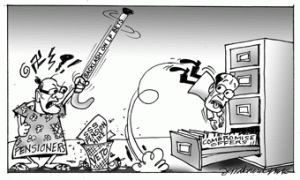This is in reaction to President Aquino’s attendance, yet again, in an inauguration of a coal-fired power plant, this time an Aboitiz project, in Davao City (“Green groups see red over Davao coal plant,” Front Page, 1/9/16).
P-Noy has been consistently gracing coal power plant inaugurations since the launching of the La Paz, Iloilo, coal power plant in April 2011. It is a reflection of how the Aquino administration puts a premium on the expansion of coal power use in the country, ignoring its clear environmental, health and climate costs.
There are currently 32 operating coal-fired power plants, comprising 32 percent of the country’s total installed generating capacity, and a staggering 62 percent of the total output of committed and indicative power projects.
This alarming trend is rooted in the energy privatization policies embodied by the Electric Power Industry Reform Act (Epira) that the Aquino administration has refused to repeal. The Epira has prevented the Philippine government from putting up its own power projects and effectively regulating private power producers.
Coal is currently the biggest contributor to global greenhouse gas emissions that aggravate global warming. P-Noy’s more than five years of fossil fuel addiction betrays his glowing rhetoric and pledge to cut carbon emissions, which he made during the recently held 21st Conference of Parties of the United Nations Framework Convention on Climate Change.
The latest in Mr. Aquino’s consistent “tour of duty” around coal power plants, and the public uproar that ensued, made sure that history will forever remember the Aquino administration’s so-called “daang matuwid” as one paved with coal pollution and climate disruption.
The upcoming elections are an opportune time for the people to decisively bare and reject this brand of dirty politics. Politicians from the local to the national level, who have supported coal expansionism, should be denied our votes and exposed to the public as environment and climate criminals.
Take the current crop of presidential aspirants. Davao City Mayor Rodrigo Duterte unequivocally supported the Davao coal power project despite the protest of local residents. While completely silent on the issue, former interior secretary Mar Roxas’ pledge of continuing the daang matuwid is indirectly a promise of more coal power projects. Vice President Jejomar Binay is also reported to have supported certain coal power projects such as the one in Cadiz City.
Miriam Defensor Santiago, though not known to have a categorical opposition to coal, has filed a Senate version of the One Million Solar Roofs Bill championed by Bayan Muna Representatives Neri Colmenares and Carlos Zarate. On the other hand, Grace Poe stands for a shift from fossil fuels to renewable energy.
None of the “presidentiables” has acknowledged the inextricable link of the Epira to our country’s coal addiction. Not one of them has called for the repeal of the Epira. Roxas, like P-Noy, recently floated some rhetoric on reviewing the energy policy but has actually perpetuated it. Santiago strongly criticized privatization under the
Epira, but did not categorically call for its repeal. Binay, on the other hand, has instead called for the full implementation of the Epira.
There is an urgency to depart from the coal-ridden trajectory of P-Noy’s power policies toward an energy regime that prioritizes people’s interest and ecological health. Let the upcoming electoral exercise be the beginning of this crooked energy pathway’s end.
—LEON DULCE, campaign coordinator, Kalikasan People’s Network for the Environment, secretariat@kalikasan.net


